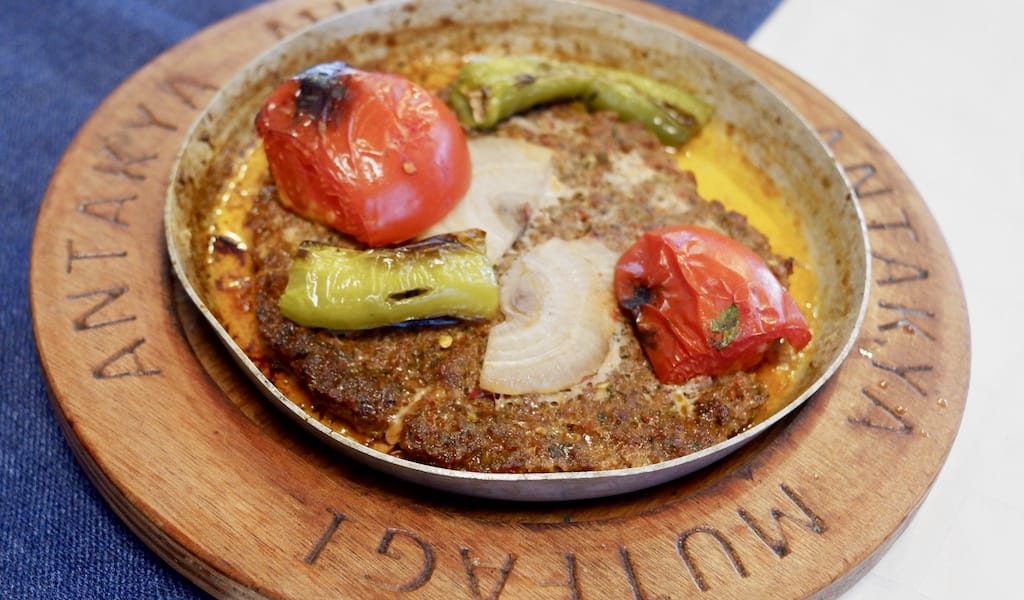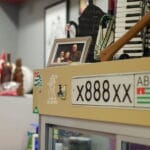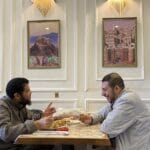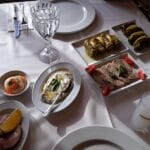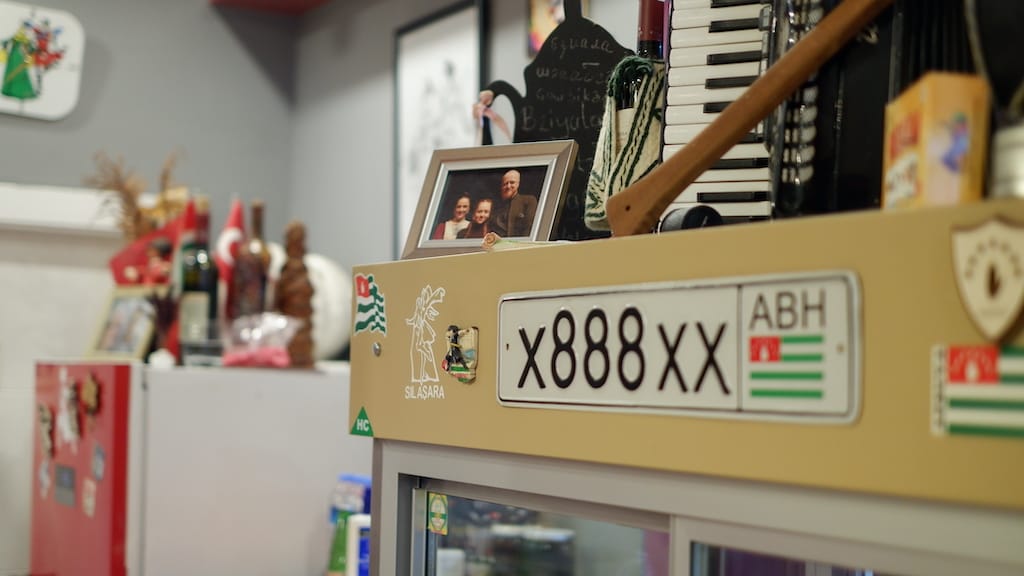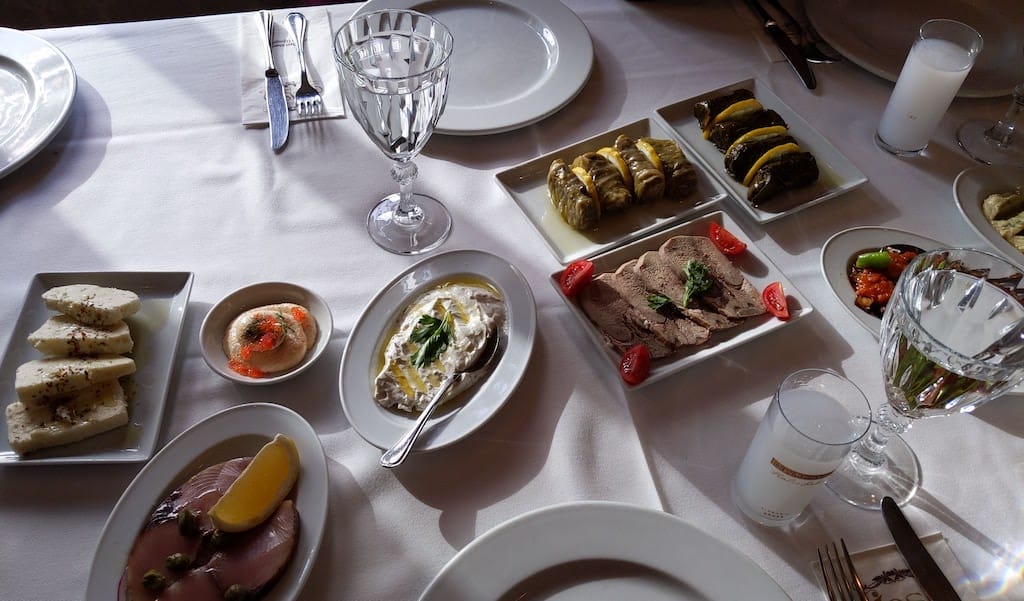Tucked away on the fourth floor of a nondescript building in the heart of Istanbul’s Beyoğlu districts lies a hidden gem that we just discovered, despite the fact that Antakya Mutfağı has been in business for twenty years. Here, the Kar family serves up the cuisine of the southern province of Hatay, which boasts some of Turkey’s richest food.
Can Yaşar Kar, the restaurant’s founder, is a furniture-maker by trade who decided to open the place as a hobby and serve faithful renditions of Antakya classics. Historically known as Antioch, Antakya was among the most important cities of its kind during the Roman Empire, and is known for a wealth of historic structures, an iconic archaeology museum, and its cosmopolitan, multi-confessional population. Antakya Mutfağı is now run by his son Sofo, who graduated from university with a degree in international relations but decided that he wanted to helm the restaurant. The Kar family are from a village in the Hatay district of Altınözü, adjacent to the provincial capital of Antakya. They are Greek Orthodox Christians who speak Arabic as a mother tongue, members of a tiny community with a deep history in Antakya.
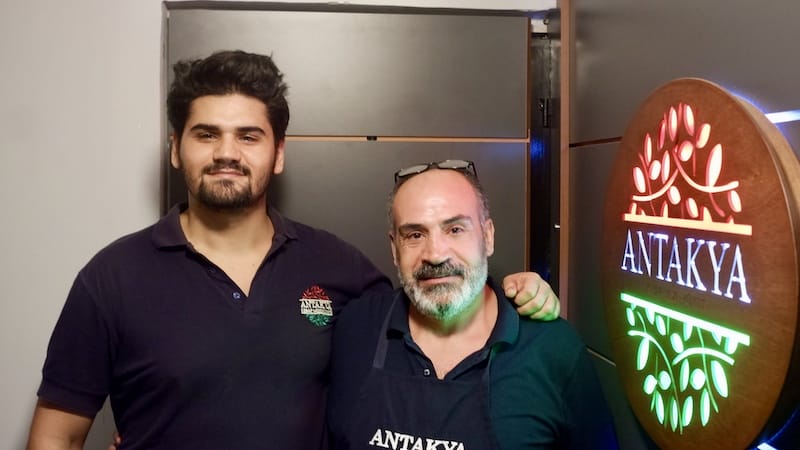
When we spoke, Kar waxed poetic with a deep expression of grief on the rich diversity of Antakya, where he says no one was afraid to conceal their name or religion, and where people of different faiths celebrated each other’s holidays. “We learned about marginalization in Istanbul,” Kar said. His family moved there in the 1980s, and his parents ultimately left for Europe, as have much of Turkey’s Christian minority in recent years. Kar, however, stayed put and opted to share the virtues of his homeland in the big city.
“As an Antakya restaurant, we are one of the best representatives of Antakya in Istanbul. In order for people to experience our real flavors, we get all of our products from there. We are proud and happy because we are trying to represent our culture in the best way possible,” Kar said.
“When it comes to the quality of our products, we do not make concessions,” he emphasized.
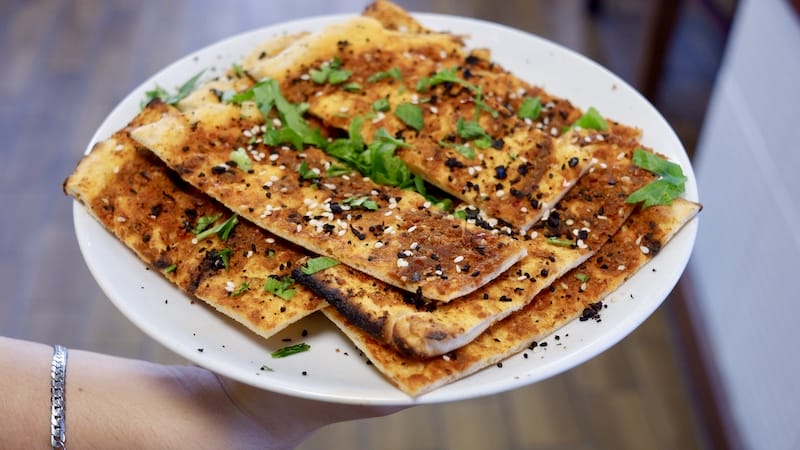
This is evident from the first bite of hummus, which is drizzled with an olive oil of supreme quality that cannot be found on the shelves in Istanbul, and which was sourced from the fields of Kar’s village. Other key ingredients like salça (tomato and/or pepper paste) nar ekşisi (pure pomegranate sauce) and zahter (a mixture of dried spices and herbs and also a type of wild oregano) and all of the cuts of meat come from the same village.
After starting with the superb hummus, which goes well with carefully-selected tomatoes and pickles, we move on to Antakya’s signature meat dish: sini kebabı, also known as tepsi kebabı. Tepsi is the Turkish word for the thin metal pan in which this succulent kebab is baked; sini is its equivalent in Arabic. A circular, thin slab of expertly-cut meat, usually a mix of beef and lamb, is shaped in the pan, chunks of tomatoes and red peppers are added, and it is tossed into the oven to be perfectly cooked and eaten with flatbread. The flavor brought us back to Antakya, with the one difference being that the tomato salça added to the dish made this version even juicier.
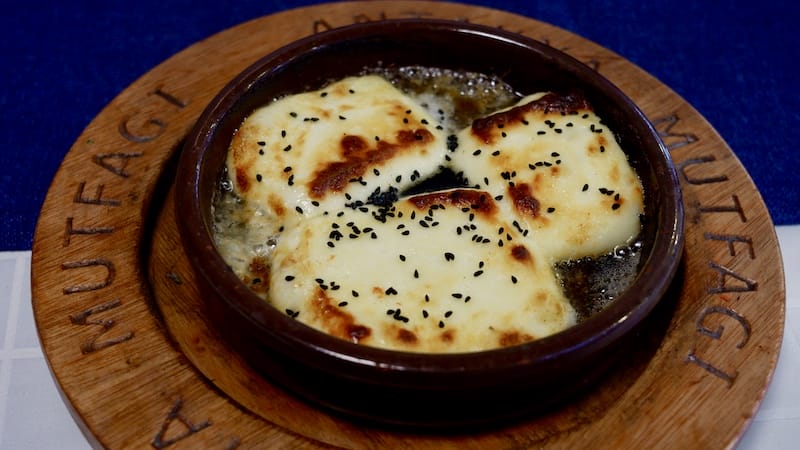
On another visit, we start with Antakya parça peyniri which is fried in a small clay pot and topped with nigella seeds. The cheese was rich and delicious, perfectly chewy and similar to a slightly less dense halloumi. For the main course, we opted for the harbiye tavuk, which Kar said is one of his most popular dishes. This was a large plate with a hefty boneless chicken breast slathered in salça and cooked slowly on low heat to ensure that it was ultra-tender, and served alongside pickled peppers, tomatoes and red onions. It is one of the most delectable chicken dishes we’ve ever tasted.
Most of Hatay’s Orthodox community was displaced following the devastating February 6th earthquakes that reduced Antakya to rubble, leveling its historic church, which dates back to 1900. The Kar family avoided tragedy, as they did not lose any relatives and while their family home was damaged, it is not beyond repair as their village is located several kilometers away from the fault line and didn’t witness the destruction that occurred in the city center.
The earthquake was nevertheless disastrous for the diverse demographics of Antakya and Hatay, which include Sunni Muslims, Alawites, Jews, Greek Orthodox and Armenian Apostolic Christians. The shop and home of Kar’s brother-in-law, a jeweler in central Antakya, were destroyed. Nearly the entire Christian community resettled in the Mediterranean coastal city of Mersin, which is home to the lone Orthodox church in the region that wasn’t damaged by the quake.
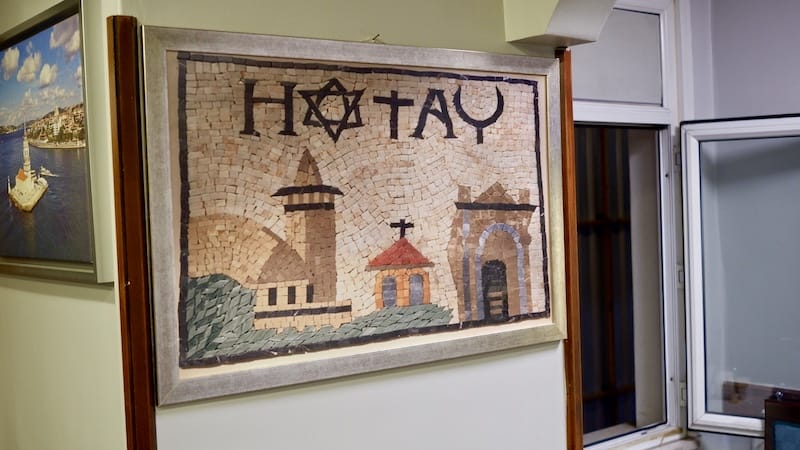
Due to the earthquake, having goods shipped from the villages of Hatay has become more difficult and expensive. Kar explains that suppliers bring local products to the bus station on the outskirts of Antakya, where they are transported by bus to another station in Istanbul. Kar goes there with his minibus and takes the products to the restaurant.
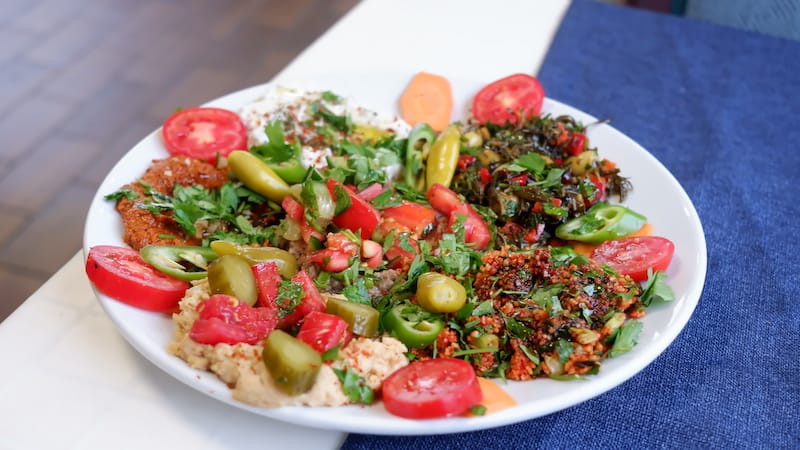
This dedication to quality, flavor and staying true to Antakya food culture has resulted in a loyal customer base, in addition to a consistent tourist clientele. “We have a lot of regulars, people who have supported us from day one and continue to do so, and who ordered delivery during the pandemic. We are grateful,” Kar said.
Until recently, Antakya Mutfağı served alcohol, and we became well acquainted with how meze of the region pair perfectly with a glass of ice-cold rakı (or four). The restaurant reached the peak of its popularity during this period and was also open on the fifth floor. Reservations were often necessary and there was even a line out the door. However, this often led to late nights where Kar and his crew would be closing at 5 a.m., resulting in spending little time with his family. Prioritizing his loved ones, Kar opted to stop serving booze so he would be able to close up at a much more reasonable hour.
Can and Sofo Kar are the ultimate embodiment of the esnaf, proud tradesmen that prioritize quality and customer satisfaction over a quick profit. Kar regaled us with a touching story of a tourist from Saudi Arabia who demanded to see the menu upon entry due to being previously swindled by tourist-trap restaurants. Another advantage Kar has is that Beyoğlu is highly popular among Arab tourists and he is able to communicate with them in Arabic. Kar told the man and his wife that he would treat them to a cup of tea and show the menu right away, assuring the couple that they were in good hands.
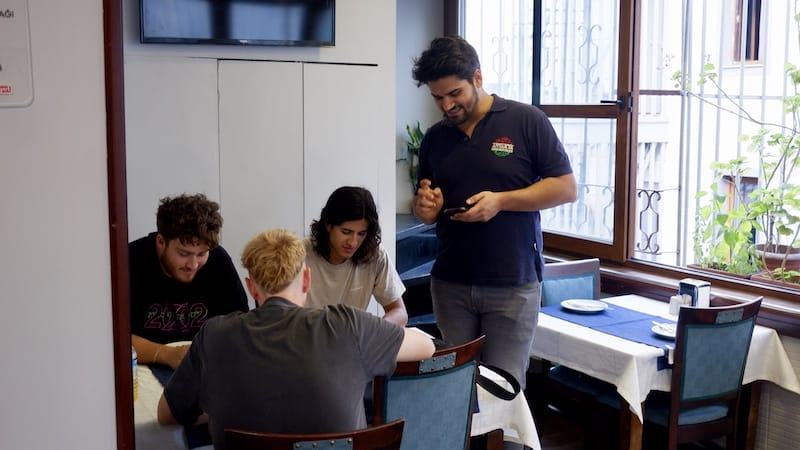
“I told him ‘You are a guest brought here by God, and if you believe me and trust me, I am not here to conduct business with you, I’m going to fill your stomach,’” Kar said. The man embraced Kar, enjoyed his meal and said that he would come again. He came back several days later, saying that Kar was his brother and that he intended to bring him a gift. The man then returned with two boxes of high-quality dates. At the time, Kar was at his furniture workshop, but Sofo called his dad who made a beeline to the restaurant, and again hugged the man before he departed.
At the end of our meal, the generous Kar treats us to a cup of coffee in a tulip-shaped tea glass – a Hatay tradition – alongside a serving of kabak tatlısı, crunchy bits of caramelized pumpkin topped with crushed walnuts and tahini sauce. Sofo then gifted us with a kitchen towel with the restaurant’s name and logo emblazoned on it. Until the pandemic, Antakya Mutfağı did not have a sign at the building’s entrance, which may explain why we just discovered it despite having spent much time in Beyoğlu over the years. The only reason they have one now is because during the pandemic they took delivery orders to stay afloat and put a small sign up so the drivers could find the restaurant. For so many years, this hidden spot maintained its popularity solely because of the superb quality of the food and the warm, genuine nature of the Kar family, who value customer satisfaction and authenticity above all.
“You can’t harvest anything without cultivating it first,” Kar said resolutely.
Published on November 20, 2023
Related stories
June 23, 2023
IstanbulIn every corner of Istanbul, enticing traces of Turkish cuisine from throughout the country, as well as the cooking of other neighboring regions, can be tucked away in the city's backstreets. These range from a Bulgarian kebab joint in Bağcılar on the western European side to a Bosnian meyhane in Pendik on the eastern stretches…
January 4, 2023
Istanbul | By Joshua Levkowitz
IstanbulEntering Mandy Meydan, a Yemeni restaurant in Başakşehir, a middle-class neighborhood of gated communities in Istanbul, we encountered a dizzying cluster of cubicles, each holding diners seated on a carpeted floor and eating family style. Amid the din of laughter and clanging metal platters, we quietly called out for our Yemeni friend Abdo. He opened…
December 20, 2022
IstanbulDespite 2022 being shaped by Turkey's deep economic crisis, Istanbul's restaurant scene remained resilient amid three-digit inflation and prices that seemed to increase every other day. Nevertheless, many bars, restaurants and tavernas stayed full as people turned to food and drink to help cope. With all Covid-19 restrictions removed, the sector enjoyed its best year…







































